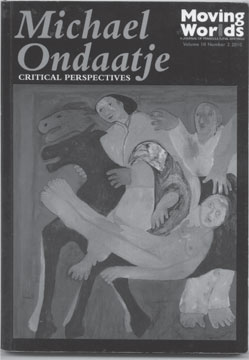Critical perspectives on Ondaatje's work
Reviewed by Chandana Dissanayake
In their Editorial to Vol.10. No.2 of Moving Worlds, Professors
Shirley Chew and Chandani Lokuge state that ranging widely across his
oeuvre and approaching his fiction, poetry and films from fresh and
interesting angles, the essays in this issue leave us in no doubt of
Michael Ondaatje's distinction and achievements as a writer of our time.
|

Michael Ondaatje: Critical Perspectives
Moving Worlds, Vol.10, No.2
Shirley Chew & Chandani Lokuge (Eds.),
University of Leeds |
Coming as it does several months following the publication of this
issue of Moving Worlds, this review should record that the statement is
indeed true and the only inevitable exclusion within the journal's
content happens to be a critique of Ondaatje's most recent
semi-autobiographical/picaresque work The Cat's Table.
In her essay 'Framing Fame: Michael Ondaatje's Cinema of Affection
and Liminality', Milena Marinkova observes that 'Ondaatje recognises...that
the encounter between the worlds of art and reality is always partial
and the line between the two simultaneously elusive and impossible to
obliterate.' The comment is followed by the pertinent observation that
while some of Ondaatje's works reiterate 'the impossibility of
containing reality and art in separate frameworks', that his 'work is
replete with images of photographs coming to life, paintings being
penetrated, films spilling into reality.'
Referring to critical opinion on Ondaatje's poetry, Catherine Bates
in 'Dancing Discard: Michael Ondaatje's Elimination Dance' alludes to
the poet's 'preoccupation with violence and beauty, chaos and form,
nature and art...' Offering the view that Elimination Dance 'is a
descriptive poem' Bates emphasizes that it does not fit 'comfortably
alongside Michael Ondaatje's early lyric poetry nor his later and more
politically engaged fiction' and that 'it remains awkwardly on the
sidelines.'
'The photographic portraits in Running in the Family...work with the
written text to change the way in which we approach the past and images
of the past' , states Jeffrey Orr in 'Photographic Empathy: Michael
Ondaatje's Running in the Family and W.G Sebald's The Emigrants.' 'In
Running in the Family, Ondaatje addresses...duality in photographic
meaning by carefully (re)positioning the reader, so that we move from
approaching the images included in the text as evidential illustrations
of the historical truth value of the narration to approaching them as
family photographs with emotional, rather than evidential, value.'
Orr adds: 'One of the conceits of photographic realism is that we see
in the photograph what the photographer sees through the camera. The
picture plays with this conceit by holding out the possibility that, in
viewing it, we are looking through the eyes of Ondaatje's father.
Rhetorical address demands a topos, the identification of common ground,
so this image draws the viewer into a position of common identity
through familial affinity.'
Responding to issues of the poetics of cultural representation in the
Canadian literary environment of the late twentieth century, Aparna
Halpe observes that 'Ondaatje's early work consistently spawned a heated
critical debate' over such representation.
In her study 'Fielding Ondaatje: A Brief Look at the 'Canadian'
Response', she further comments that 'the anxiety over Ondaatje's
narration of Sri Lanka invites a particularly complex negotiation of
issues of agency and location that, in turn, provokes a varied and
fruitful exploration of differing critical practices.'
The use of language in Running in the Family according to this
critique 'is bound to the many times and places (the author) carries
within himself as a diasporic writer partly educated in Sri Lanka,
England and Canada.
It is shaped by the more contemporary inheritance of writing in
Canada during a literary renaissance peopled by writers such as Nichol,
Rudy Wiebe, Margaret Atwood and Robert Kroetsch.'
In 'The Return Journey and the Aesthetic of Rasa in Michael
Ondaatje's poetry', Chandani Lokuge observes that 'driven by the desire
for an alternative vision of life 'that makes them more at ease with
(themselves)' writers such as Salman Rushdie, V.S. Naipaul and Michael
Ondaatje return physically or imaginatively to their homelands.
So far these return journeys have been researched for their
positioning within key socio-political themes in postcolonial
discourse.'
Seeing his work in a different light and exploring the application to
Ondaatje's writing of the classical Indian theory of aesthetics, the
theory of Rasa, Lokuge advances the view that Ondaatje works with ' a
set of concepts that forms part of the aesthetic of traditional Sri
Lankan culture...That Ondaatje deliberately applies the philosophical
and aesthetic preoccupations of the theory of Rasa to some of his
writings is an index to his interest in them and an invitation to us to
reconsider his writing in this light.'
Referring to Ondaatje's re-reading of his homeland, Lokuge states:
'As a diasporic subject myself, my fascination with Ondaatje's later
poetry and fiction lies not only in his return to the homeland for
creative inspiration-story, plot and setting, for example-but in his
creative revitalisation and rejuvenation of indigenous aesthetics.'
In his contribution (Anil's Ghost as Symphonic Poem: Viewed in the
Context of Michael Ondaatje's re-engagements with Sri Lanka) to this
volume, Ashley Halpe refers to yet another aspect of the issue of the
author revisiting the homeland, this time with Anil's Ghost: 'Michael
has not explained why he returned to the project of re-engaging with Sri
Lanka.
Nor, I think, do we need to ask. Sufficient unto us that such a
wonderful and gifted spirit yielded to that compulsion and began to
search himself and to search for the reality of that terrible time when
a miasma of fear and the reek of blood and burnt flesh clogged our noses
and even more our tongues, when every moment of compassion or concern
was fraught with a conscious courage and tremors of trepidation, mingled
with guilt at not doing more..'
A superb read for the students of postcolonial writing, academics and
critics, Michael Ondaatje: Critical Perspectives is published as content
of Moving Worlds, an internationally refereed journal based at the
University of Leeds. |

